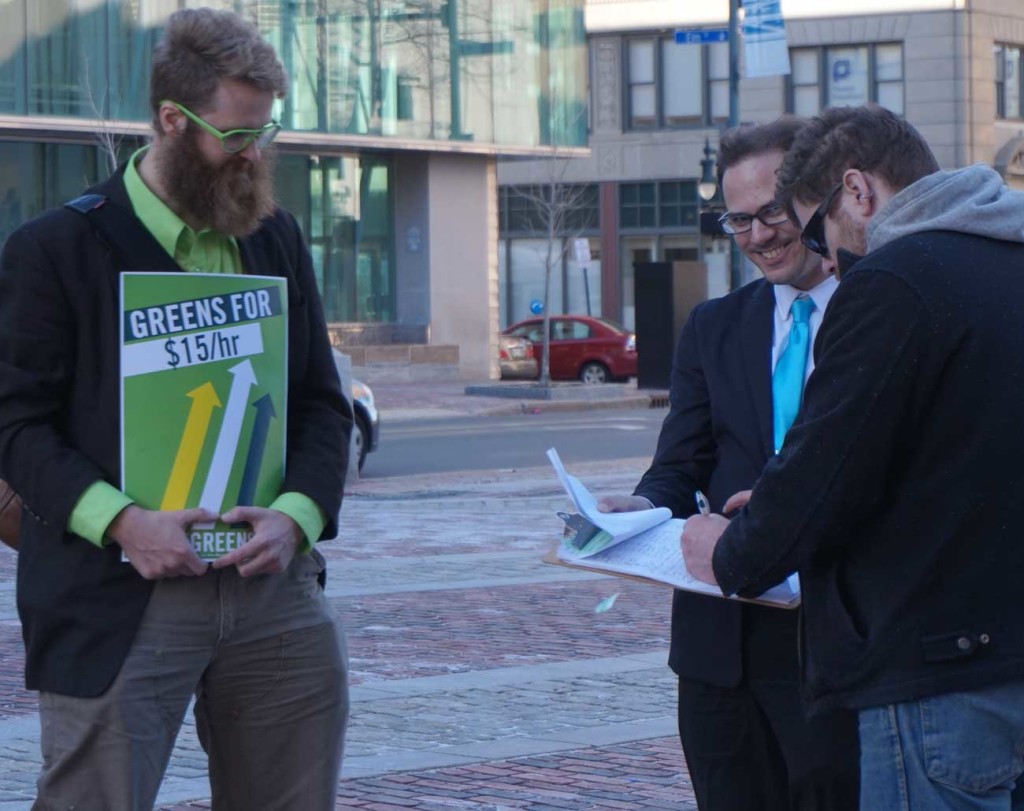Adam Marletta
Everything one needs to know about Portlanders’ current struggle for a living wage is contained in the lead sentence of a recent Portland Press Herald/Maine Sunday Telegram front-page story:
“Small-business owners–particularly restaurant operators–said…they are growing tired of the…debate over increasing the minimum wage in Portland.” (“Minimum wage uncertainty drags on,” 07/22/2015.)
Restaurateurs, small business owners of Portland– In the cloying words of Bill Clinton, “I feel your pain.”
But you know what is worse than having to endure a debate over raising the minimum wage…? Actually trying to get by as a minimum wage worker in Maine’s most expensive city!
The rest of the story, by PPH reporter, Randy Billings, is little more than a press release from elite business owners outraged at the prospect of having to pay their workers (gasp!) more than the state’s anemic $7.50 an hour. Some, like Michelle Corry, owner of Petite Jacqueline and Five Fifty-Five, even threaten to leave the state if the minimum wage is raised.
(Corry is the vice chairwoman of the Maine Restaurant Association, a fact Billings does not acknowledge in his story.)
This is the same sort of adolescent extortion, incidentally, that the Republican Party routinely engages in when it threatens to shutdown the federal government if it does not get its way.
It also suggests a considerable amount of power and influence on the part of the “small business” community, which is thoroughly at odds with the constant narrative of the beleaguered mom & pop shop that is just barely scrapping by. Indeed, I am trying to imagine my boss’s reaction if I were to threaten to walk out the door unless he gives me a raise.
But the important thing to take away from the story is this: The city’s capitalist class is frightened. And that is a good thing.
Revolution, writes Chris Hedges in his Truthdig.com column, “[I]s about ripping power away from a cabal of corporate oligarchs and returning it to the citizenry. This will happen not by appealing to corporate power but by terrifying it” (“Make the Rich Panic,” 05/03/2015).
So far, most of the discussion surrounding the minimum wage has focused exclusively on its impact on tipped workers. This myopic focus on tipping–whether patrons will continue to tip restaurant servers if the city raises the minimum wage–is a distraction.

Asher Platts and Adam Marletta collect a signature for the $15 minimum wage referendum petition.
While the Portland City Council arrogantly debates which of the city’s minimum wage workers are worthy of a (slight) raise and which can continue to scrape by on an insulting $3.75 an hour, the Portland Green Party is campaigning to establish a living wage for all of Portland’s workers.
This November, Portland voters will have a chance to raise the city’s minimum wage to $15 an hour by 2019. Fifteen dollars is approximately what the federal minimum wage would currently be if it had kept pace with inflation since 1968, though some estimates put it closer to $21.
(It is worth noting the only reason the City Council finally enacted Mayor Michael Brennan’s proposed $10.10 an hour after months of dithering and an attempt to significantly water the ordinance down, is because of the pressure the Portland Greens exerted with their superior initiative. Keep this scenario in mind the next time somebody tries to dismiss the relevance of third-parties in American politics. As six-time Socialist presidential candidate, Norman Thomas, famously remarked, “My greatest achievement is how many of my issues were stolen by the Democratic Party.”)
The city’s capitalist class — via its official mouthpiece, The Portland Chamber of Commerce — and the Maine Restaurant Association have already unleashed a barrage of spin and propaganda to convince Portlanders raising the minimum wage would have devastating effects on the local economy. None of it is true.
Raising the minimum wage will not lead to higher prices. It is not a “job killer.” All of the states that raised the minimum wage at the start of 2014 saw greater job growth than those that did not according to the Department of Labor. And it will not mean tipped workers will make less money for the simple fact that tipping is not a guaranteed form of income.
What a higher minimum wage will do is cut into the bourgeoisie’s profits. And that is why they oppose it.
Indeed, a majority of Portlanders, 55 percent, support a $15 an hour living wage, according to a citywide poll conducted earlier this spring. Thus, if the initiative is voted down this November, it will not be due to a lack of voter support. Rather, it will be a result of the hundreds of thousands of dollars the business community is likely to throw at defeating the ordinance.
According to Ralph Nader in a recent op-ed in the Boston Globe (07/30/2015), raising the minimum wage would “help address the growing wage gap that exists in this country.”
“Over the past 40 years, the minimum wage has lost one-third of its purchasing power,” Nader writes. “…Raising it to $15 would provide much needed relief to more than 51 million Americans.”
Only by making the power elite nervous can we as citizens hope to effect meaningful change.
It was the mobilized pressure of socialists and radicals that forced FDR to enact the New Deal during the Great Depression–a fact conveniently glossed over in Ken Burns’ hagiographic PBS documentary, The Roosevelts. It is precisely why the Democratic Party is funneling everything it has into unseating socialist Seattle City Councilor Kshama Sawant this fall. Sawant spearheaded Seattle’s adoption of a $15 minimum wage last year.
“If there is no struggle, there is no progress,” Frederick Douglass famously observed.
Those who profess to favor freedom, yet deprecate agitation, are men who want crops without plowing up the ground. They want rain without thunder and lightning. They want the ocean without the awful roar of its many waters. This struggle may be a moral one; or it may be a physical one; or it may be both moral and physical; but must be a struggle. Power concedes nothing without a demand. It never did and it never will.






Demanding a Living Wage
Adam Marletta
Everything one needs to know about Portlanders’ current struggle for a living wage is contained in the lead sentence of a recent Portland Press Herald/Maine Sunday Telegram front-page story:
“Small-business owners–particularly restaurant operators–said…they are growing tired of the…debate over increasing the minimum wage in Portland.” (“Minimum wage uncertainty drags on,” 07/22/2015.)
Restaurateurs, small business owners of Portland– In the cloying words of Bill Clinton, “I feel your pain.”
But you know what is worse than having to endure a debate over raising the minimum wage…? Actually trying to get by as a minimum wage worker in Maine’s most expensive city!
The rest of the story, by PPH reporter, Randy Billings, is little more than a press release from elite business owners outraged at the prospect of having to pay their workers (gasp!) more than the state’s anemic $7.50 an hour. Some, like Michelle Corry, owner of Petite Jacqueline and Five Fifty-Five, even threaten to leave the state if the minimum wage is raised.
(Corry is the vice chairwoman of the Maine Restaurant Association, a fact Billings does not acknowledge in his story.)
This is the same sort of adolescent extortion, incidentally, that the Republican Party routinely engages in when it threatens to shutdown the federal government if it does not get its way.
It also suggests a considerable amount of power and influence on the part of the “small business” community, which is thoroughly at odds with the constant narrative of the beleaguered mom & pop shop that is just barely scrapping by. Indeed, I am trying to imagine my boss’s reaction if I were to threaten to walk out the door unless he gives me a raise.
But the important thing to take away from the story is this: The city’s capitalist class is frightened. And that is a good thing.
Revolution, writes Chris Hedges in his Truthdig.com column, “[I]s about ripping power away from a cabal of corporate oligarchs and returning it to the citizenry. This will happen not by appealing to corporate power but by terrifying it” (“Make the Rich Panic,” 05/03/2015).
So far, most of the discussion surrounding the minimum wage has focused exclusively on its impact on tipped workers. This myopic focus on tipping–whether patrons will continue to tip restaurant servers if the city raises the minimum wage–is a distraction.
Asher Platts and Adam Marletta collect a signature for the $15 minimum wage referendum petition.
While the Portland City Council arrogantly debates which of the city’s minimum wage workers are worthy of a (slight) raise and which can continue to scrape by on an insulting $3.75 an hour, the Portland Green Party is campaigning to establish a living wage for all of Portland’s workers.
This November, Portland voters will have a chance to raise the city’s minimum wage to $15 an hour by 2019. Fifteen dollars is approximately what the federal minimum wage would currently be if it had kept pace with inflation since 1968, though some estimates put it closer to $21.
(It is worth noting the only reason the City Council finally enacted Mayor Michael Brennan’s proposed $10.10 an hour after months of dithering and an attempt to significantly water the ordinance down, is because of the pressure the Portland Greens exerted with their superior initiative. Keep this scenario in mind the next time somebody tries to dismiss the relevance of third-parties in American politics. As six-time Socialist presidential candidate, Norman Thomas, famously remarked, “My greatest achievement is how many of my issues were stolen by the Democratic Party.”)
The city’s capitalist class — via its official mouthpiece, The Portland Chamber of Commerce — and the Maine Restaurant Association have already unleashed a barrage of spin and propaganda to convince Portlanders raising the minimum wage would have devastating effects on the local economy. None of it is true.
Raising the minimum wage will not lead to higher prices. It is not a “job killer.” All of the states that raised the minimum wage at the start of 2014 saw greater job growth than those that did not according to the Department of Labor. And it will not mean tipped workers will make less money for the simple fact that tipping is not a guaranteed form of income.
What a higher minimum wage will do is cut into the bourgeoisie’s profits. And that is why they oppose it.
Indeed, a majority of Portlanders, 55 percent, support a $15 an hour living wage, according to a citywide poll conducted earlier this spring. Thus, if the initiative is voted down this November, it will not be due to a lack of voter support. Rather, it will be a result of the hundreds of thousands of dollars the business community is likely to throw at defeating the ordinance.
According to Ralph Nader in a recent op-ed in the Boston Globe (07/30/2015), raising the minimum wage would “help address the growing wage gap that exists in this country.”
“Over the past 40 years, the minimum wage has lost one-third of its purchasing power,” Nader writes. “…Raising it to $15 would provide much needed relief to more than 51 million Americans.”
Only by making the power elite nervous can we as citizens hope to effect meaningful change.
It was the mobilized pressure of socialists and radicals that forced FDR to enact the New Deal during the Great Depression–a fact conveniently glossed over in Ken Burns’ hagiographic PBS documentary, The Roosevelts. It is precisely why the Democratic Party is funneling everything it has into unseating socialist Seattle City Councilor Kshama Sawant this fall. Sawant spearheaded Seattle’s adoption of a $15 minimum wage last year.
“If there is no struggle, there is no progress,” Frederick Douglass famously observed.